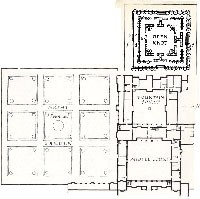|
Since these gardens did originate
in the drearier climate of England, the amount of sunlight
on the garden will affect the plants. Although most of the
plants found in the designs can tolerate six to eight hours
of sun in zone 6, more tropical or arid climates may have
trouble sustaining the plant material. The garden is a place
of relaxation and building shady nooks or incorporating the
natural shade patterns into this design is crucial.
Moreover, in near the walkways or in these cozy corners, the
more fragrant material should be positioned for easier
enjoyment and accessibility. A good source for plant
material ideas and designs in a more temperate climate is
the Elizabethan gardens in the Outer Banks, North Carolina.

|
|
An important consideration
concerns the fact that many of the plants in this style
garden are edible, not only for human consumption, but
natural neighbors as well. The enclosed wall, whether living
or fence will help deter some predation. However, deer could
still be a problem, in addition, to the smaller scavenging
animals. The low-growing knot work could serve as an
excellent condominium complex for a variety of wildlife. A
side note to this as well, if the fruit and herbs are to be
edible then spraying pesticides and herbicides could be a
dangerous contaminant.
Another aspect of the garden to
consider is maintenance. How much pruning will be necessary
to keep the orderly concept of the Elizabethan style?
Perhaps dwarf varieties of authentic species would be a good
addition. Moreover, the question of period or modern
techniques of watering and upkeep arises. Watering, of
course, is a greater factor depending on geographical
location.
|



